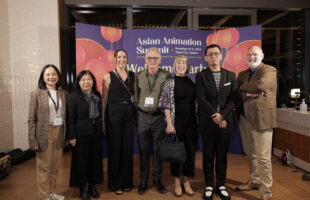the hallyu, or wave of Korean feature films and dramas that has seen Korean dramas, Korean music and Korean stars triggering heart palpitations in territories across Asia has been hitting global media shores and capturing the imagination and the pocketbooks of some of the world’s biggest media players. Contrary to most expectations, the Korean wave has grown stronger – despite the fact that critics had predicted that it was on the wane. Korean drama in particular has sent audience temperatures, as well as ratings and license fees, soaring from Japan to China, from Indonesia to Vietnam, from Malaysia to the Philippines. “Epic dramas are now in fashion in Korea,” notes Kevin Kwon, head, Global Strategy Team at KBS. “Also, in TV Entertainment, reality shows have a very strong following.” Currently, among KBS’s top rating programs are the dramas Mom’s Dead Upset, You Are My Destiny as well as the reality show Two Days and One Night. Two Days and One Night is Korea’s first ever road-trip show that features the adventures of six fun-loving celebrities as they take off on a memorable road-trip around beautiful Korea. Kwon notes the highest rating for a weekend show in the previous six months is the weekend drama Mom’s Dead Upset, which achieved the rating of 25 percent – 30 percent since it first began airing on February 2. Mom’s Dead Upset is about a middle-class family of three generations that run a laundromat. The mother of the family has planned out the lives of her three children her whole life. However, all three end up with partners that don’t quite suit their mother’s taste. Said Kwon, “This is a story of a family where analog and digital generations co-exist. The mother, who has lived her life praying for her children’s well-being is gaining Korean audiences’ sympathy.” KBS also report strong sales of Korean dramas to Asian markets and beyond. “Japan, Taiwan, China, the Philippines are major markets for Korean content. Among them, Japan is the biggest one. Although Korean historical dramas have been considered hard to sell in the Japanese market, KBS made a US$3,500,000 deal with a Japanese distributer for Korean epic dramas this year,” revealed Kwon. “India and Arabic countries and South America are our new and promising markets. We are currently in the midst of discussion with Indian and Arabic broadcasters to promote our contents and we are preparing to launch our dramas in South America,” he added. KBS showcases Korean culture to a potential audience of 40 million households in 60 countries, and 181,170 rooms of 760 hotels. “Korean Drama is dominant in Asia with the demands are getting higher in CIS, Central Asia and Middle East. KBS HD documentaries, such as Asian Corridor in Heaven, Noodle Road and A Human Land are very popular in Europe, East Europe and Middle East,” said Kwon. “For Europe and North America, we are preparing to sell the format of our entertainment shows, for example, Happy Together and The Golden Bell Challenge to overcome the culture discount. Western productions consider our entertainments very creative and enjoyable,” added Kwon. Of late, the KBS drama Formidable Rivals was sold before it was aired. This drama portrays the job of bodyguards in the presidential residence Chungwadae. “Although it is not a big budget drama, it received a lot of attention in Singapore, Vietnam and other countries. As a result it was sold to Japan, Taiwan, and China. Up to now KBS made approximately US$700,000 deal with several companies like SPO (Japanese distributer) and Videoland (Taiwanese program provider),” said Kwon. According to Lee, Sang-Oak, director, International Business, Munhwa Broadcasting Corp., drama series are still popular to produce and the film industry is also eyeing this sector. “I expect Korean television viewers to see an increasing number of TV dramas directed by moviemakers and starring movie actors and actresses. Also, more and more Korean drama series are based on previous hits of other genres such as films and comic books,” says Lee. “On terrestrial television, Korean content fills more than 90 percent of airtime. But on the cable and satellite side, Korean audiences are beginning to see programs from an increasing number of countries. When it comes to ratings, Korean content is strong. But we do see some foreign content such as American drama series, EPL and drama from neighboring Asian countries doing well especially on cable and satellite television,” notes Lee. Although Korean content has been well received in foreign markets, especially in Asia over the past several years, Lee acknowledged that since last year, the growth rate has slowed down somewhat. “There are a few reasons for that, I believe. It could be due to increasing domestic production in our client countries. Escalating competition in the regional content trade market may be contributing to that too,” said Lee. At present, Japan is MBC’s largest client and beyond the traditional Asian market, MBC is well received in other places like Turkey, Iran and Hungary. “Later this year, we hope to reach other Middle Eastern nations and Eastern Europe. Also, we wish to get closer to Latin American viewers,” expressed Lee. While drama is still the leading driver, MBC sees other strong performers like unscripted/reality/ variety programs. MBC’s Infinite Challenge, for one, saw an increase in overseas inquiries on its formats as well as outright program purchase. MBC has also made recent inroads in European and non-Asian markets with documentaries such as Wildlife in the DMZ (Demilitarized Zone), Ganga (The Ganges River): The Allure of the Golden Land, and The Yellow River. MBC is currently working on two in-house production projects. One is a story about a female figure skating athlete while the other one is a historical drama about the most influential queen in the history of Korea. “It will be a big-budget epic drama series, which we at MBC expect to replicate or even surpass the enormous success of Jumong, Prince of the Legend,” says Lee. MBC expects both of these dramas to start broadcasting in Korea late this year or early next year. In addition, MBC will have several titles for international distribution in the second half of the year – they are East of Eden, Beethoven Virus, Love and Law and My Woman. Lee is optimistic towards the impact of HD and new media on Korean content production. “I believe that new ways of producing and distributing our content could only help us better serve our audiences both domestic and international. Any producers and broadcasters should make best efforts to widen their demographic reach. For instance, we should not just wait for young audiences who tend to migrate gradually to new media platforms such as mobile TV returning to traditional TV screens. In two ways, we need to follow where they are going,” comments Lee. MBC is making their existing content available for mobile and Internet viewing, notes Lee. “One example is, of course, expanding our full-length VOD and download services. We are trying to make the most of the emergence of new media platforms such as IPTV and mobile TV here in Korea and abroad. The other is making our content more suitable for new media viewing. This may include abbreviated versions of full-length content to be exhibited on mobile and online video services. Second, as far as HD production is concerned, MBC as a producer has to make more investment in production,” says Lee. Lee added that MBC is trying to figure out how to justify such increase. Since the domestic advertising market is stagnant, MBC needs to find new revenue streams. Despite this new challenge, HD is also providing them with new opportunities, especially winning back audiences. Nowadays, MBC produces virtually 100 percent of its drama series and documentaries in HD format, which, they hope, would give them a competitive edge vis-à-vis other video services in the Korean media market. In addition, MBC is also studying how to make itself ready to provide HD content to audiences overseas. Korean programming is showcased on Arirang TV. Among its most popular programs are entertainment daily magazine Showbiz Extra; Super Kids, a quiz program for kids in English; and Let’s Speak Korean, a Korean language education program. Internationally, Arirang TV reaches 57.5 million homes in 188 countries. “This year, our focus is on Korea and Japan as we are aware that there are many loyal fans of Korean dramas in Korea,” says Moon H. Lee, sales manager, Arirang TV. According to Arirang TV’s Lee, major stations in Korea have either shifted their concentration to the local market or are getting ready for the local market. “They are knocking in various ways like investments, co-operation, trade and localizing,” says Lee. There is fierce competition from American drama series but it is only on cable channels. Korean content is still standing strong and will stay at the same position for a while, notes Kim Young Won, deputy managing director, SBS Productions. Among SBS’s top programs this year have been dramas First Wives Club, I Am Happy, and On Air. Kim notes First Wives Club achieved the highest for a weekend show in the previous six months. SBS’s standout drama is On Air, a drama about the behind the scenes of TV drama production. It also portrays how the whole production team and performers complete a project in a tight schedule and how actors, actresses, and entertainment agencies handle rumors surrounding them. “Its average rating was about 20 percent,” says Kim. While Kim sees steady growth in some markets and slow growth in others, “the market is expanding beyond Asia for sure,” Kim added. SBS’s biggest concentration of viewers among other countries is in Taiwan, Hong Kong and China. Given the variations in the popularity of programs across the various territories, Korean drama’s diverse reality is playing well with audiences. “It has to do with a country’s culture. For some territories such as the Middle East, the influence of religion is in every aspect of the society,” observes Kim. SBS’s Il-jimae the Phantom Thief has been sold to Japan. The drama was a big hit in Japan and SBS is wrapping deals with Japan though Kim maintained that “details can’t be released at this time.” In a breakthrough deal, SBS is presently in negotiations on a series that is not on air yet. “That is quite significant considering the current market situation,” says Kim. SBS’s Kim is encouraged to find Philippines’ major networks such as GMA and ABS-CBN acquiring several scripted formats from them. He says the remake version has been quite successful. Currently, Korean drama is still the dominant genre as it makes its impact on Korea TV audiences. While there is no competitive genre to Korean drama right now, Korean producers have been eager to introduce other kinds of new media platforms like digital mobile broadcast (DMB), mobile, internet protocol television (IPTV) and internet online service, notes JK Khan, sales manager, CJ Media. That, according to Khan, generates the need for other kinds of programs (for example, quiz shows) that are suitable for each platform. In regards to recent news reports stating that unrestricted IPTV services can be expected in South Korea later this year, Khan feels optimistic. “Through developing a new media and platform, most of the Korean broadcasting companies will face a new environment and I think it will be both a great opportunity as well as a crisis at the same time. On the other hand, content providers (CP) will get a new chance to create different styles of program focus on education, entertainment and infotainment to fit on new platforms,” said Khan. According to Khan, once the IPTV service starts, the broadcasting dominion will be changed largely. “Because IPTV companies are handled by the telecommunications industry which has a huge amount of budget and they are going to take up a big portion in the media market in Korea. And they need more contents for their platform – which means some kind of new CP will be created in proportion to the channels,” commented Khan. “However, Korean producers will not give up drama – which has guaranteed the highest rating in Korea,” revealed Khan. According to Hakik Hwang, manager, Institute of Strategy Media Planning, Cheil Worldwide, Korean dramas will always dominate. “Recent trends have shown that Korean melodramas and Korean historical-based dramas are always very popular. Based on the trends, melodramas sometimes overtake the Korean historical ones. For example, in 2007, melodramas were slightly more popular but this year, there are two really big major historical dramas that everybody is watching,” says Hwang. Hwang noted that The Coffee Prince was one of the most popular melodramas last year. This year, two Korean historical dramas, Sejong Dae Wang (King Sejong) on KBS2, as well as Lee San (the name of the Korean dynasty, Li) on MBC is the most watched Korean historical drama, revealed Hwang. The first Korean historical drama that really kicked off the Korean historical drama trend was Dae Jang Gum (Jewel in the Palace) which was not only successful in Korea, but within Asia as well, Hwang added. And what of the challenges facing Korean TV dramas? “The production costs are getting higher and higher because of the competition between drama productions,” admits Kwon of KBS. “The competitions between drama productions are also becoming fiercer and fiercer because they should secure the time slots of Korean terrestrial broadcasters and hedge the risk for failing in overseas distribution. So they spend more money on contracting the best writers and Korean celebrities. Thus, Korean broadcasters pay much more money to buy dramas that they make. It means Korean broadcasters have to sell the license with higher price to recoup the production costs. We are very worried about the situation. We are trying to find a way to solve this situation.”
Ad – Before Content
Related Articles
Sphere Abacus sells true crime feature documentary Murder & Madness: The Cult Conspiracy to Prime Video
Spingo Continues Global Push into the Americas as O4 Media Signs Option Agreements with LA-based 5X Media and Brazilian outfit LaReina Entertainment
Keshet boards Red Alert with producer Lawrence Bende
FIFTH SEASON inks strategic partnership with Front Street Pictures for TV movies slates
Taiwan Hosts Asian Animation Summit for the First Time Bringing Together Major Buyers Netflix and Warner Bros.
Sphere Abacus appoints Toby McCathie as Finance Director







